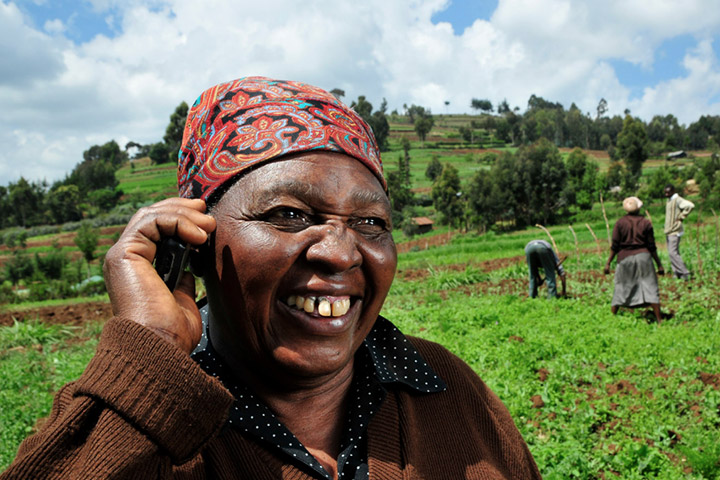Leveraging Mobile Technology to Drive Sustainability in Agriculture in Emerging Markets
Leveraging Mobile Technology to Drive Sustainability in Agriculture in Emerging Markets
Leveraging Mobile Technology to Drive Sustainability in Agriculture in Emerging Markets
Program: Dow Sustainability Fellows Program
Program details » | All Dow Sustainability Fellows Program projects »

Mobile Technology is Improving Agriculture in Africa
(Dow Fellows Program 2014)
Introduction
The agriculture sector is increasingly impacted by climate change. Variable weather patterns, soil erosion, and industrial agricultural practices have caused considerable damage to the farming community, particularly in developing countries. However mobile and other technological developments provide an opportunity to improve agricultural practices in developing countries and facilitate better adaptation to climate change.
Challenges in Emerging Economies
Agricultural practices are significantly different in developed markets, such as the United States, than in emerging markets, such as Sub-Saharan Africa. Challenges in developed economies include lower water tables, soil degradation, greenhouse gas emissions and increased nitrification of soil and water bodies. Emerging economies also face some of these challenges, but also must deal with a lack of infrastructure and scarcity of technical expertise in advanced farming techniques. The predominant cultivation of certain cash crops (e.g., soya, and palm oil) has resulted in soil degradation and a loss of bio-diversity. Over usage of fertilizers and pesticides is also a major concern with industrial scale farming in developing countries.
Further, the agriculture industry in most emerging market countries includes a large number of farms managed by families with limited technical and mechanical support, and poor access to finances. A lack of storage and transportation facilities causes a significant loss of harvested crop material, before it reaches the end consumer. There is a need to address these and several other challenges in emerging economies.
Mobile Technology to Drive Sustainability in Agriculture in Emerging Markets
Rapid advancements in technology provide an opportunity to connect and serve a large number of farmers in emerging market countries. With the rapid adoption of smart phones, it’s possible to serve smallholder farmers and connect them to governments, large corporations and other resources.
Through smart phones and social media applications, farmers can access education and information about a range of agricultural topics. In addition, farming communities can exchange information with each other, and with agricultural experts, on best farming practices. Translation services on web browsers can also help them access information in the language of their choice.
One of the major benefits of connectivity to information technology is the availability and access to weather information, and geographical data. Soil conditions can be monitored in combination with weather information to determine what to grow, and when to plant, fertilize and harvest crops. Farmers also access information about the length of the growing seasons for crops, and the risks (e.g., droughts, floods, and extreme storms) they might encounter during the season. Geographic data provides valuable information on pests and animal diseases, allowing farmers to assess their level of risk.
Among the financial benefits of mobile technology, information about real-time pricing allows farmers to decide whether to buy or hold, and identify the best crops to grow. Agricultural price information may help farmers sell their products at better prices, and provide reliable food price information to policy makers, preventing price volatility and speculation. On the demand side, there is a preference to buy goods locally, reducing transportation costs.
Mobile technology can also help increase product traceability, with information about disease, pest tracking, and storage. Also, product traceability can improve public health by pinpointing the origin of produce, allowing officials to communicate risk information to consumers and others in the supply chain. A connected system allows for more efficient and effective farming methods and provides information about problems to reduce risks to farmers and consumers.
Conclusion
Collaborative content management systems allow businesses to manage geographic information. Farmers create and share web-based maps with information about soil conditions, weather patterns and other data. Also, this information allows farmers to respond to significant risks, and minimize potentially negative impacts.
Mobile and other technology provides opportunities for businesses to leverage the use of inexpensive sources of information. This information can help level the playing field for poor communities and small businesses. It can also inform a number of decisions.
Food buyers, exporters, farmers and other stakeholders are already benefitting from using a mobile network. Emerging markets using mobile technology are well positioned to deliver a significant portion of the world’s agriculture, improve efficiencies, and reduce the environmental impact of farming.
Team Members
Ursula Jessee, Ross School of Business (RSB) and School of Natural Resources and Environment (SNRE); Aditi Moorthy, SNRE; Alex Papo, RSB and SNRE.
Support
Made possible by The Dow Chemical Company, the Dow Sustainability Fellows Program at the University of Michigan supports full-time graduate students and postdoctoral scholars at the university who are committed to finding interdisciplinary, actionable, and meaningful sustainability solutions on local-to-global scales. The program prepares future sustainability leaders to make a positive difference in organizations worldwide.